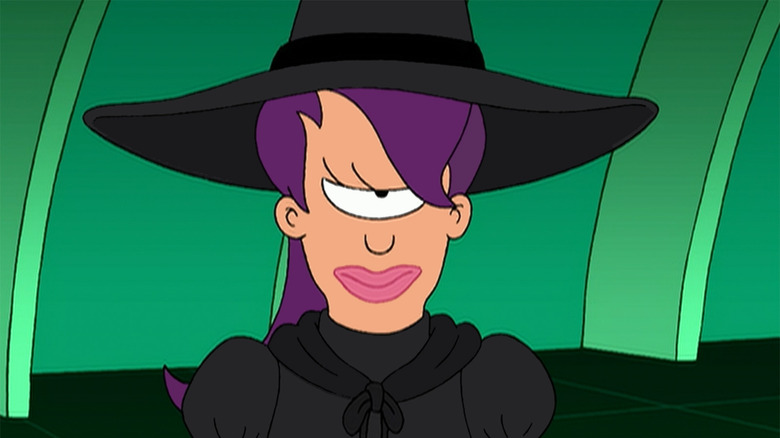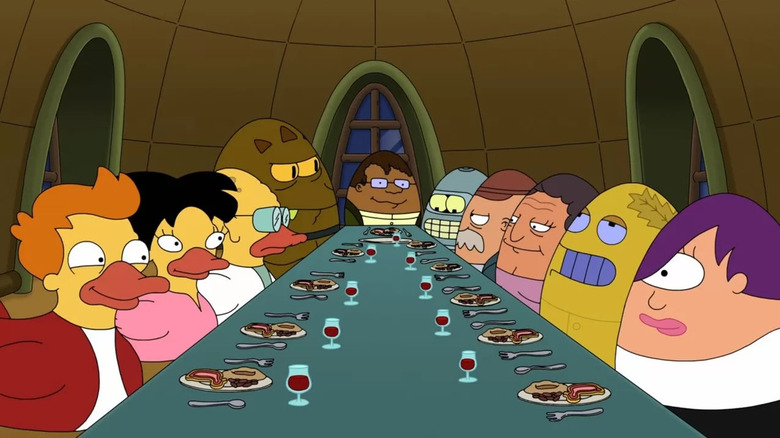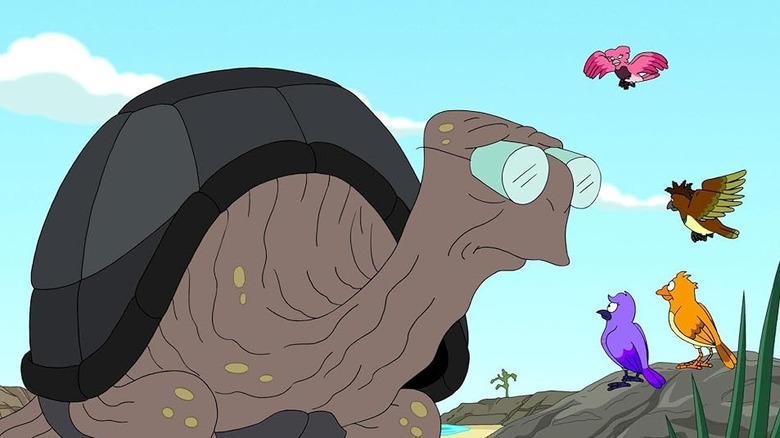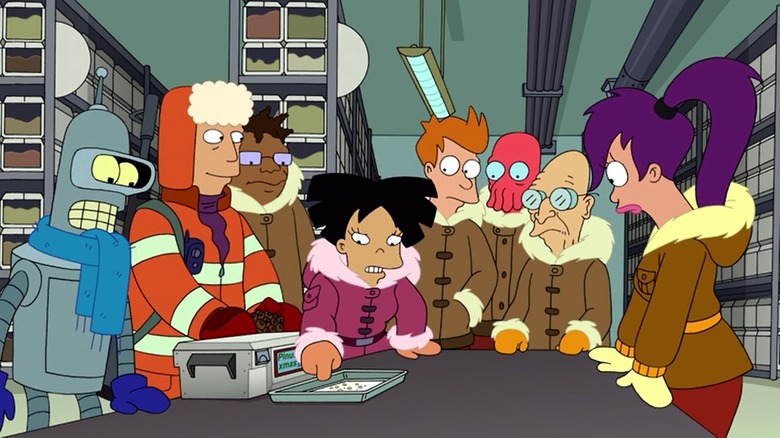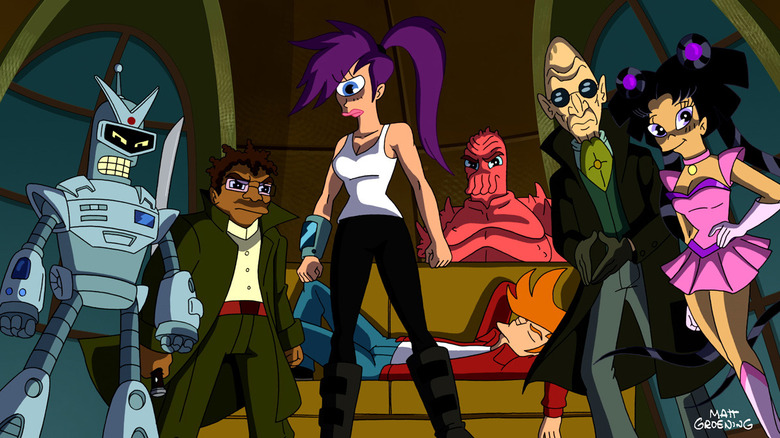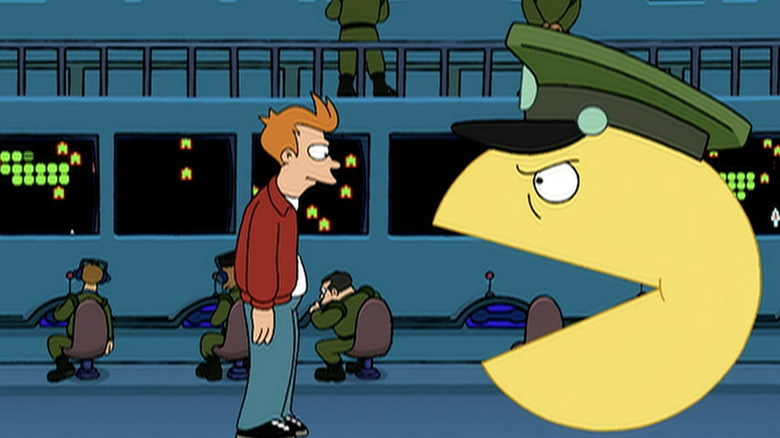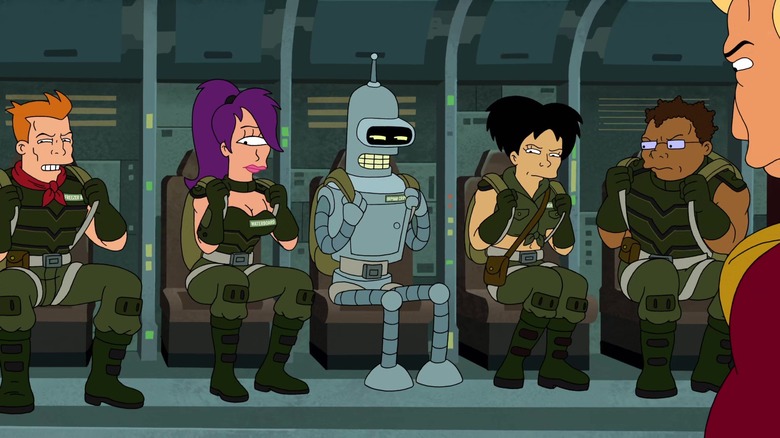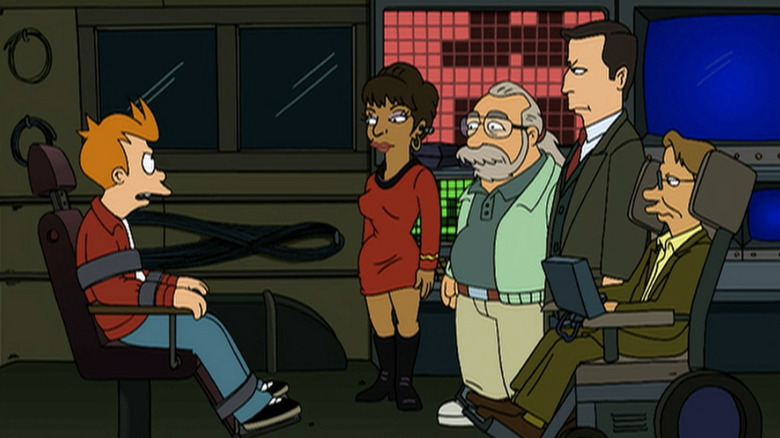Every Futurama Anthology Episode Ranked
"Futurama" is no stranger to out-there stories, but sometimes, even this show needs an excuse to break the rules. That's where the anthology episodes come in: installments featuring three seven-or-so-minute-long themed segments where the status quo of the show doesn't apply.
"Futurama" inherited this formula from co-creator Matt Groening's previous series, "The Simpsons." However, "The Simpsons" developed a consistent formula for its anthology episodes: "Treehouse of Horror," where the Simpsons family (and friends) are put through parodies of horror/sci-fi stories (from "The Twilight Zone" to "Death Note"). "Treehouse of Horror" has been an annual "Simpsons" tradition since season 2, but the series isn't constrained by this. A handful of "Simpsons" episodes are anthologies of a different flavor (see "Simpsons Bible Stories" in season 10 or "Tales from the Public Domain" in season 13).
"Futurama," though? The sci-fi show doesn't have an equivalent tradition, perhaps as part of the show's efforts to not compete with "The Simpsons." During the series' original run on Fox, there were two episodes produced under the banner of "Anthology of Interest" (in seasons 2 and 3, respectively), where the main characters ask the "What If" machine questions about how their lives could be different. It's clear the creators wanted this to be "Treehouse of Horror" for "Futurama," but the show was canceled before any hypothetical "Anthology of Interest III" could be made.
Several revivals later, "Futurama" does an anthology episode once a season, but has ditched any consistent format for them. Here's every anthology episode of the series, ranked!
7. The Prince and the Product
"The Prince and the Product" was part of "Futurama" season 11, which streamed in 2023 on Hulu. That season as a whole received muted praise (read /Film's "Futurama" season 11 review here), and "The Prince and the Product" is especially infamous. Some have already called it the show's new worst episode.
The episode's backdrop, in which the crew makes a delivery to the King of Space and Leela falls for his son, is already unengaging. At this point, Fry and Leela's love story shouldn't be subject to artificial drama. The anthology segments (presented as commercial breaks) do nothing to rescue the episode, instead only sinking it further.
The theme is that in each of the three segments, the main characters are a different type of toy. In the first they're wind-up toys, in the second they're Hot Wheels, and in the third half are rubber duckies and the other half are wobbles (resulting in a feud). The results are bewildering and simply unfunny. Watching "The Prince and the Product," you can never grasp the rhyme or reason that brought the writers to this idea, nor why they stayed their course in pursuing it.
6. Naturama
Like "The Prince and the Product" later did, "Futurama" season 9 finale "Naturama" puts the characters in totally different contexts — as animals. In the first segment, they're salmon; in the second, Professor Farnsworth is an ancient tortoise and the others are finches who hang out on his shell; finally, in the third, they're elephant seals. Series regular Phil LaMarr also narrates the episode like a nature documentary, for maximum National Geographic aesthetics.
The first segment is the best, with yet another heartwarming Fry and Leela love story (even if it ends with them dying after mating, as salmon do). It also has the funniest cameos, with several supporting cast members showing up as predators; Matcluck, the alien chicken lawyer, is a heron, while Lrrr — ruler of the planet Omicron Persei 8! — becomes Brrr — devourer of fish and honey (and boy scouts)! The later two segments fall shorter, but they do have some sensible animal casting (from the Professor as a tortoise to Bender as a brutish "Alpha Male" elephant seal).
The theme of "Naturama" at least makes more sense than "The Prince and the Product," and its jokes about the futility of nature are in-line with the show's cynical sense of humor. The ending of segment 3, where a beta male seal (Kif) challenges Beach Master (Bender) ends not with an underdog victory, but Kif being crushed to death. Nature is a cruel mistress, especially on a show as merciless as "Futurama."
5. The Futurama Holiday Spectacular
"Futurama" has done several straightforward Christmas (or as it's called in the 31st century, Xmas) episodes — many of them starring a murderous robot Santa. To close out season 7 (the show's first on Comedy Central), the show did something different, using an anthology format to highlight three holidays: XMax, Hanukkah (well, Robanukah), and Kwanzaa. Each episode has an environmental message too, though not an uplifting one.
"The Futurama Holiday Spectacular" may be set during times of celebration, but it's the most mean-spirited of the episodes on this list. In each segment, the cast brutally dies. In Xmas, the crew saves Earth's pine tree population from extinction but boosts oxygen levels so high that Bender's cigar ignites the atmosphere. In Robanukah, the crew (Bender excluded) dies while drilling for ceremonial oil. During Kwanzaa, attempts to find some beeswax for ceremonial candles end with the crew being turned into candles.
"Treehouse of Horror" often feels like "The Simpsons" writers not just experimenting or homaging, but letting loose their sadistic impulses on the characters. "The Futurama Holiday Spectacular" is cut from that same cloth.
4. Reincarnation
The most meta "Futurama" anthology is "Reincarnation," the finale of season 8. This episode features "Futurama" rendered in different animation styles, positing what the show would be like if it was made at a different time or place.
"Colorama" shows "Futurama" in the style of a 1920s "Steamboat Willie" style black-and-white cartoon, with round character proportions, larger eyes/hands, steampunk technology, etc. "Future Challenge 3000" renders the show as an 8-bit video game. "Action Delivery Force" renders the show as an anime; specifically the imported, badly-dubbed kind (like "Robotech" or "Voltron") that the episode's creators would've watched in their childhoods.
The show manages to slip into these different styles without losing its identity, down to revamping the character designs. In "Action Delivery Force," Fry's already spiky hair stretches out Goku style, Bender and Zoidberg get overhauls so their bodies look more like armor, and Amy is dressed as Sailor Moon. Still, they're all recognizable. This segment is my favorite of the bunch, fitting every American stereotype of anime into 7 minutes — from overwritten and speedily-delivered dialogue (with alien subtitles rendered in broken English) to a power-up montage. Bender grows to mecha size, Hermes gets in a one-man helicopter that in turn becomes a simple desk, and Leela switches into a tiny mini-skirt that would have Roy Mustang's eyes watering.
3. Anthology of Interest II
The second and so-far final "Anthology of Interest" episode is not as strong as the first. The first segment, "I, Meatbag" (exploring what if Bender was human) is the best one because it is the most character-driven. Bender is overwhelmed by all the sensations of being human, from eating to kissing. His usual hedonism winds up being more self-destructive when he's in a flesh-and-bone body; by the segment's end, he's a monstrous blob of fat resembling Jabba the Hutt.
The segments after that feel too reliant on pop-culture references. Both Fry's question (What if life were more like a video game?) and Leela's (What if she found her family?) are rooted in established characterization. In practice, though, Fry's segment is just a way to cram in video game allusions (though his doomed attempt at foiling an "Alien Invaders" style attack is a highlight). Leela's is a straight-up "The Wizard of Oz" parody, a la "Treehouse of Horror" episodes that directly ape movies.
The episode feels like the writers are uncertain themselves about how to best use the "Anthology of Interest" format, which could be why they abandoned it.
2. Saturday Morning Fun Pit
The best of the "Futurama" themed anthologies is season 10's "Saturday Morning Fun Pit," throwing the characters into 20th-century American cartoons. The first two segments, "Bendee Boo and the Mystery Crew" ("Scooby Doo") and "Purpleberry Pond" ("The Smurfs") are funny enough, if shallow. What elevates this episode so high on this list is the final segment "G.I. Zapp," parodying "G.I. Joe" and how the action cartoons of the 1980s were strictly censored and bloodless.
G.I. Zapp's animated battles with A.C.R.O.N.Y.M (A Criminal Regiment Of Nasty Young Men) are anything but bloodless. So, President Nixon's head is given the job of re-editing the series. Whenever there's any bit of violence, he unconvincingly dubs it over (e.g. when an A.C.R.O.N.Y.M member is killed with an ax to the chest, Nixon throws in "Yay! I caught it!") This is a repetitive gag, sure, but one that keeps on delivering the chuckles.
What does "G.I. Joe" have to do with this series? Just remember how "Futurama" itself is a vulgar cartoon that's often angered activist parents (who were previously parodied in "Bender Should Not Be Allowed on TV").
1. Anthology of Interest I
Yes, the first is still the best. In "Anthology of Interest I," each segment is funnier than the last. Bender asks what his life would be like if he were 500 feet tall, culminating in a kaiju battle between him and a similarly giant Zoidberg. Leela discovers that if she were a tiny bit more impulsive, she'd have long ago killed the rest of the crew, whether to cover her tracks or simply because they annoyed her.
Fry asks what would happen if he never came to the future and the answer goes completely off the rails. The disruptions to the space-time continuum attract the attention of the Vice Presidential Action Rangers (including Al Gore in his first of several "Futurama" guest appearances, Nichelle Nichols, Stephen Hawking, and Gary Gygax). The absurdity of the story and the crutch of guest stars pass by because of how funny it is.
"Anthology of Interest" was devised by the writers of "Futurama" to tell extra surreal, extra-violent stories they otherwise couldn't get away with. In this particular episode, they succeeded.
"Futurama" is streaming on Hulu.
